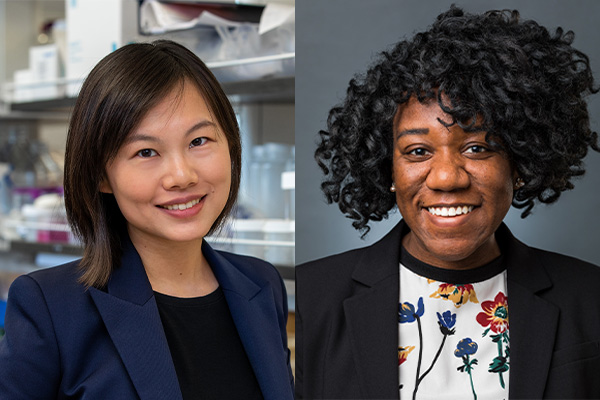Ling, alumna Ray named ‘Rising Stars’ in environmental research for 2024
Fangqiong Ling, alumna Jessica Ray named among ACS Environmental Au’s 2024 Rising Stars in Environmental Research

Fangqiong Ling, assistant professor of energy, environmental & chemical engineering in the McKelvey School of Engineering at Washington University in St. Louis, has been named among ACS Environmental Au’s 2024 Rising Stars in Environmental Research.
The journal named an international group of 18 early-career environmental researchers to its annual list of those working to improve the understanding of complex environmental issues and offering new technologies to solve or mitigate pollution.
In addition, Jessica Ray, who earned a bachelor’s in chemical engineering in 2009 and master’s and doctoral degrees in energy, environmental & chemical engineering from the Engineering school in 2015, also was named among the 18 Rising Stars.
Ling’s research group explores the principles behind the assembly of microbial communities in urban environments, combining fieldwork, experiments and computational methods to understand how microbes interact with urban environmental conditions. Her lab aims to inform engineering solutions that improve urban infrastructure, public health and sustainability. Ultimately, they aim to translate this knowledge into practical applications that can help create healthier, more resilient cities. In 2021, Popular Science magazine named Ling one of its “Brilliant 10.” She received a National Science Foundation (NSF) CAREER Award in 2021. In 2020, the International Water Association and the International Society for Microbial Ecology gave Ling the 2020 Rising Star Award for her work using metagenomics, theory and machine learning to better understand principles underlying microbial ecosystems at the interface of manmade and natural environments.
Ling earned a doctorate from the University of Illinois at Urbana−Champaign in 2016. Her Rising Stars article is titled “Evaluating GPT Models for Automated Literature Screening in Wastewater-Based Epidemiology.” Read more here.
Ray is the Robert and Irene Sylvester assistant professor in the Department of Civil & Environmental Engineering at the University of Washington. Her research developing new, engineered water treatment materials is driven by overcoming technological barriers of existing treatment processes to meet current and existing environmental threats. Current focus areas in Ray’s group are treating emerging contaminants in stormwater runoff as well as separation and destruction of per- and polyfluoroalkyl substances (PFAS) or “forever chemicals” from water sources. As a doctoral student at WashU, Ray worked in the lab of Young-Shin Jun, professor of energy, environmental & chemical engineering using surface chemistry techniques to investigate interfacial reactions of nanomaterials in water.
After earning a doctorate, Ray was a Miller Institute Postdoctoral Research Fellow (2015−2018) at the University of California, Berkeley, in the Department of Civil and Environmental Engineering, where she developed low-cost polymer−clay composites to treat urban stormwater. In recognition of her research, Chemical & Engineering News named Ray one of the “Talented 12” honorees for 2020, and she received an NSF CAREER Award in 2021.
Her Rising Stars article is titled “Simultaneous Oxidation of Trace Organics and Sorption of Trace Metals by Ferrate (Fe(VI))-Coated Sand in Synthetic Wastewater Effluent.”




